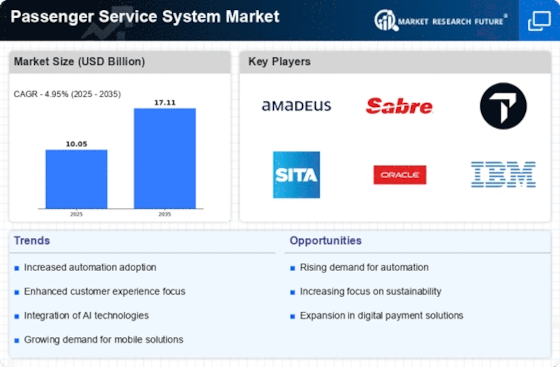Market Trends
Key Emerging Trends in the Passenger Service System Market
The Passenger Service System (PSS) market is experiencing several noteworthy trends that are reshaping the landscape of the aviation industry. One prominent trend is the increasing emphasis on digitalization and mobile solutions. Airlines are actively adopting PSS technologies that facilitate seamless and user-friendly experiences for passengers through mobile apps, enabling functions such as online check-in, digital boarding passes, and real-time updates. The prevalence of smartphones has elevated the importance of mobile-centric solutions, and PSS providers are responding by developing intuitive applications to enhance the overall travel journey.
Biometric technology is emerging as a transformative trend in the PSS market. Biometric authentication, such as fingerprint or facial recognition, is being integrated into various stages of the passenger journey, from check-in to boarding. This trend not only enhances security measures but also contributes to a more efficient and contactless travel experience. Airlines are investing in biometric technologies to streamline processes, reduce queues, and provide passengers with a frictionless journey through airports.
Personalization is a growing trend influencing the development of PSS solutions. Airlines are increasingly recognizing the importance of tailoring services to meet individual passenger preferences. This involves leveraging data analytics and artificial intelligence to understand passenger behavior and offer personalized recommendations, services, and promotions. As passengers seek more customized and relevant experiences, PSS providers are focusing on delivering solutions that enable airlines to cater to the unique needs and preferences of their passengers.
The integration of ancillary services into PSS offerings is becoming a prevalent trend in the aviation industry. Beyond traditional ticketing and reservations, airlines are exploring opportunities to generate additional revenue by offering ancillary services such as baggage fees, seat upgrades, and in-flight amenities through their PSS platforms. This trend aligns with the industry's shift towards a more holistic approach to passenger services, where PSS providers play a central role in supporting diversified revenue streams for airlines.
Blockchain technology is gaining traction as a trend that addresses concerns related to data security and transparency in the PSS market. Airlines and PSS providers are exploring the potential of blockchain for secure and tamper-proof storage of passenger data, ensuring data integrity and enhancing cybersecurity measures. This trend reflects a broader industry focus on leveraging emerging technologies to fortify the reliability and security of PSS solutions.
Environmental sustainability is increasingly influencing market trends in the PSS domain. Airlines are under growing pressure to reduce their carbon footprint, and this is translating into a demand for PSS solutions that contribute to more sustainable and eco-friendly operations. PSS providers are responding by incorporating features that optimize flight operations, reduce fuel consumption, and support airlines in achieving their environmental goals.
Interconnected systems and interoperability are vital trends shaping the future of PSS solutions. Airlines are seeking integrated platforms that seamlessly connect with various systems and third-party applications to ensure a cohesive and efficient passenger experience. Interoperability enables airlines to adapt quickly to changing technologies and market demands while fostering collaboration among different stakeholders in the aviation ecosystem.


















Leave a Comment